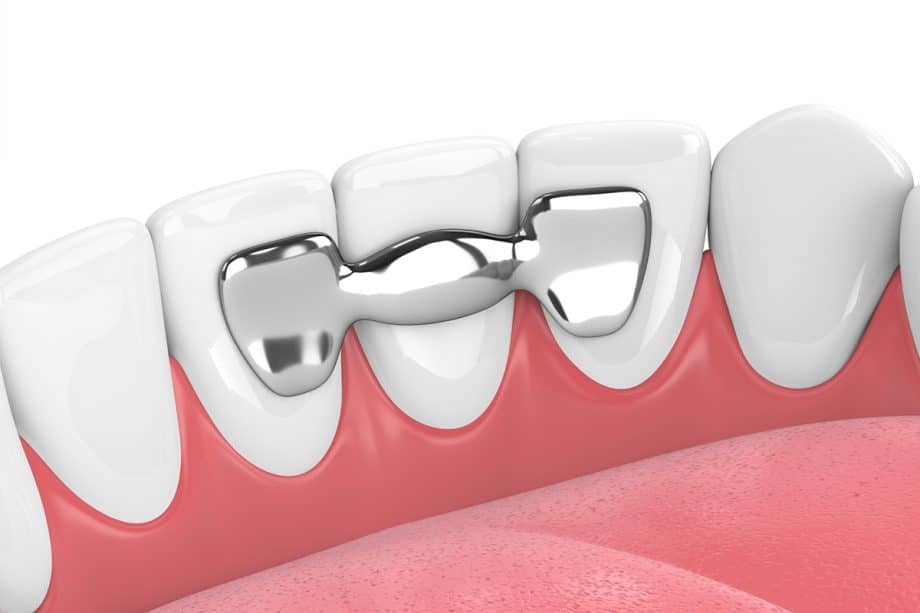A dental bridge is a common tooth replacement option. It can replace one or a few missing teeth in a row. If you have a dental bridge or you’re considering getting a dental bridge, you should know what to expect from the fit. A properly fitted bridge will provide many years of effective chewing. But an improperly fitted bridge may not last long and could even damage your healthy teeth.
Here’s how to tell if your bridge fits properly and what to do if it doesn’t.
What is a Dental Bridge?
To understand how a bridge should fit it helps to know how it works. A traditional dental bridge consists of two crowns with one or more artificial teeth suspended between them. From the side it looks like a row of artificial teeth, but when you turn it over you can see that the teeth on each end are crowns with open space to attach to an existing tooth.
A bridge replaces one or more missing teeth by “bridging” the gap between the remaining healthy teeth. The crowns fit over the existing teeth on each side of the missing tooth or teeth to provide support for the bridge. The bridge is bonded to the support teeth and remains permanently in place unless removed by a dentist.
Types of Dental Bridges and How They Should Fit
The fit of your dental bridge may depend on the type. Here are the different types of bridges and how you can expect them to fit:
- Traditional bridge. A traditional bridge is the type described above that uses healthy teeth for support. This type of bridge should sit firmly in place without moving at all. The artificial teeth (pontics) should sit against the gums without a visible gap.
- Cantilever bridge. A cantilever bridge is only supported on one side of the missing tooth. This type may be used if a back molar needs to be replaced. A cantilever bridge should still fit firmly without shifting, however, it is not as sturdy as a traditional bridge and may eventually damage the support tooth.
- Maryland bridge. A Maryland bridge is held in place with metal clasps attached to the existing teeth. It is not as sturdy as a traditional bridge and may eventually damage the support teeth.
- Implant supported bridge. An implant supported bridge is the most well supported type of bridge. Each end of the bridge consists of dental implants placed in the jaw for support. The bridge is attached to the implants via abutments and will not damage the healthy teeth in any way.
Signs of a Poorly Fitting Bridge
Here are some signs that your bridge doesn’t fit properly:
- It moves when you chew. If you feel your bridge moving or rocking when you chew, it may mean that it is loose.
- You can move it with your tongue or finger. If your bridge is loose you may be able to move it with your tongue or wiggle it with your finger.
- Sore gums under the bridge. If your bridge is loose it may chafe the gum tissue and cause irritation.
- Pain when chewing. If you feel pain when you are chewing in the area of your bridge, it may indicate that it doesn’t fit properly.
- Tight feeling in your teeth. An ill fitting bridge may feel tight against your other teeth rather than loose.
What Are the Risks of a Poorly Fitted Bridge?
When a bridge doesn’t fit properly it can cause a variety of problems, such as:
- Damage to the support teeth. A loose bridge that moves when you chew will eventually cause damage to the supporting teeth under the crowns that could lead to loss of those teeth.
- Damage to the neighboring teeth. The teeth next to your bridge could be damaged by the movement or tightness of an ill fitting bridge.
- Gum disease. Gum irritation from a loose bridge could make the gums more susceptible to gum disease. This is also true if the bridge fits too tightly against the gums or too loosely so that there is a gap.
- Gum erosion. A constantly shifting bridge could cause gum tissue erosion.
What Should I Do If My Bridge Feels Off?
If something doesn’t feel right about the way your bridge fits, contact Dr. R. Renan Williams DDS. We can assess the current condition and fit of your bridge and make any necessary adjustments to help it fit better for your comfort and oral health.
Call 817-281-4801 or contact us today to schedule an appointment.

